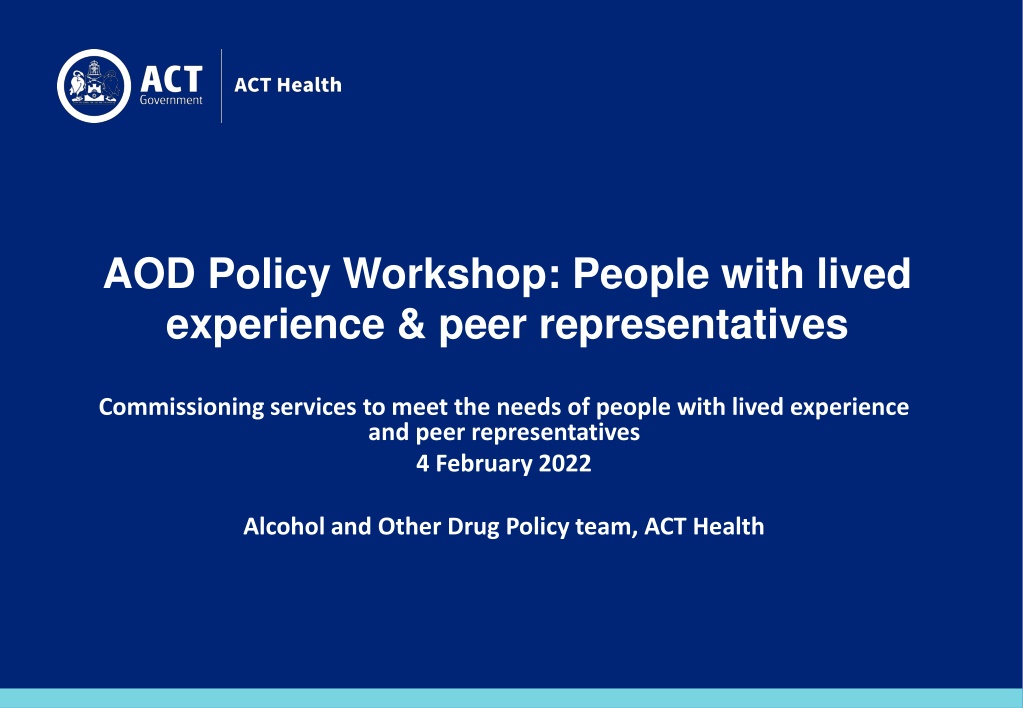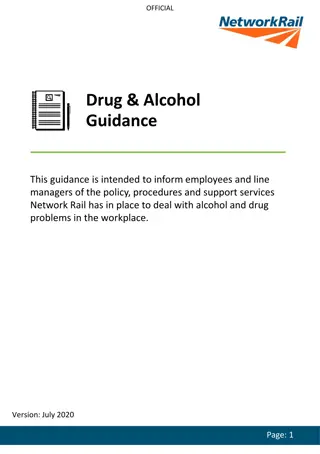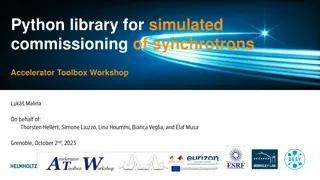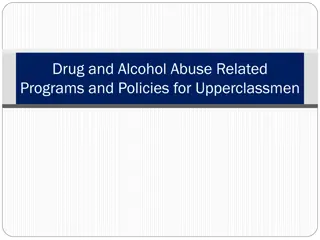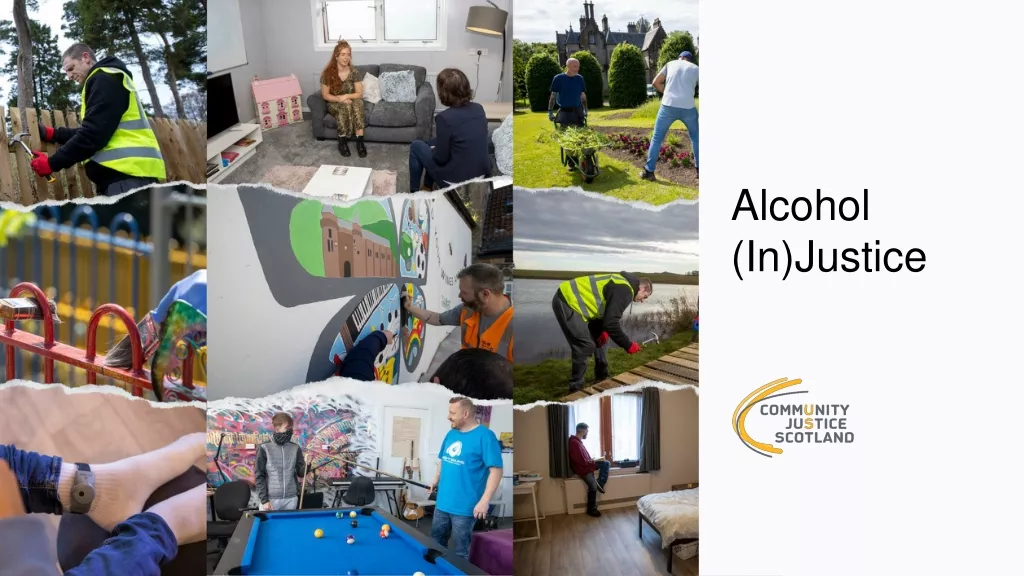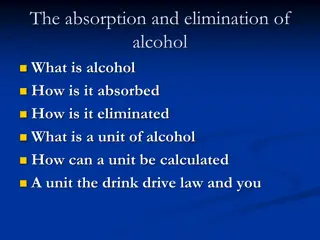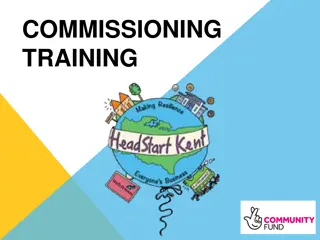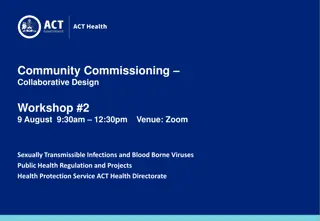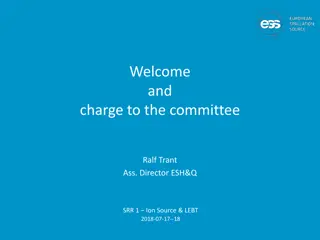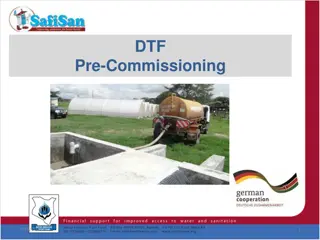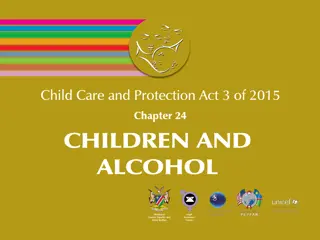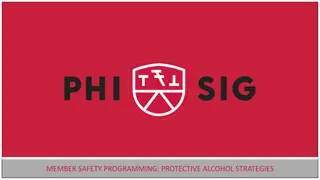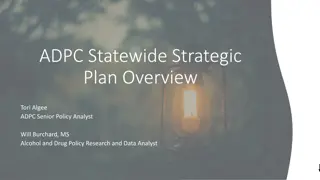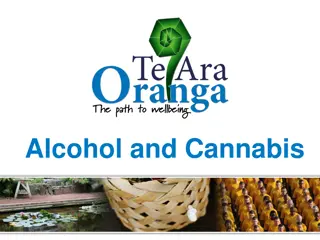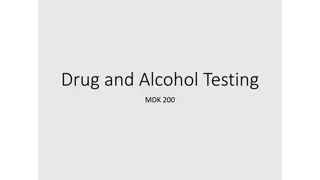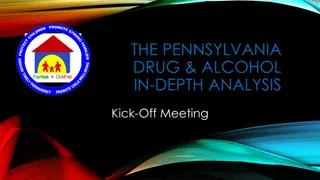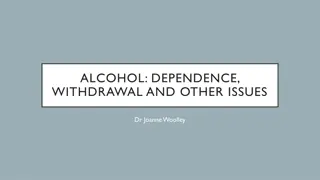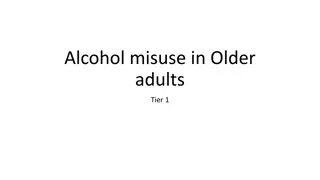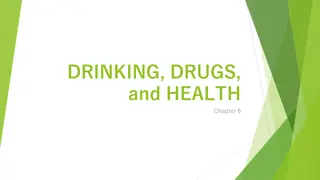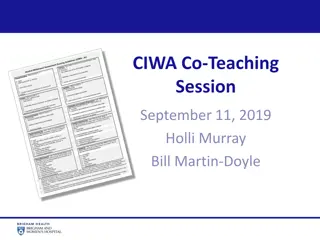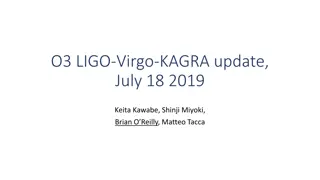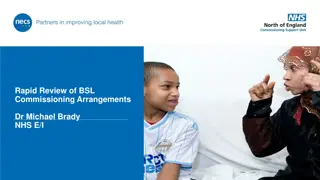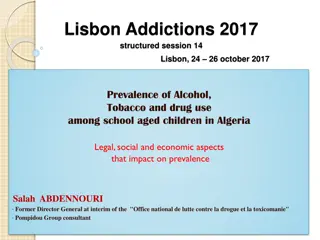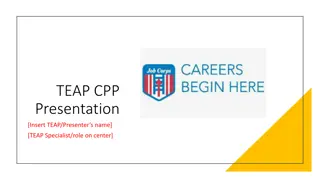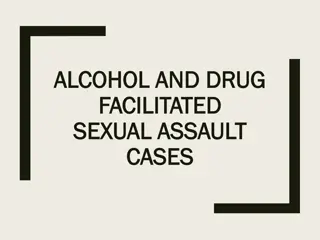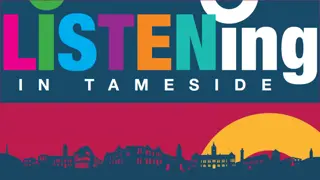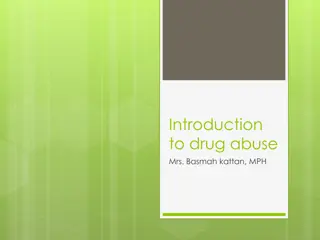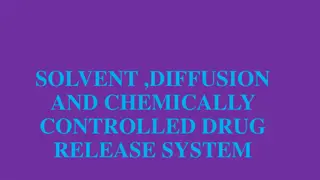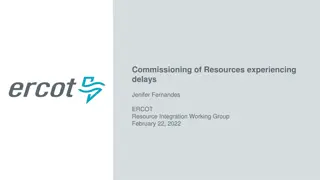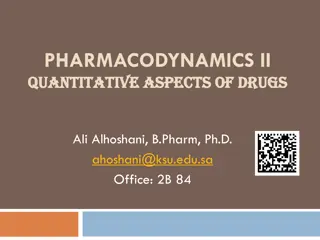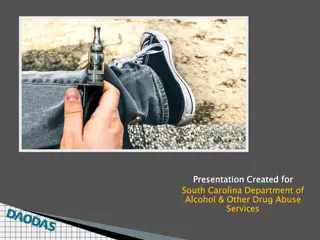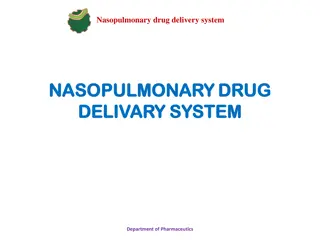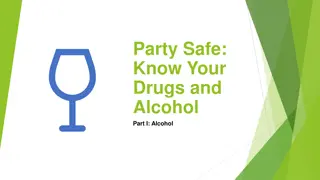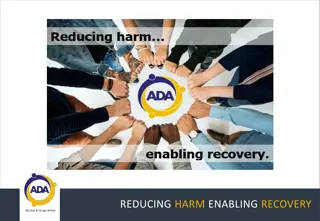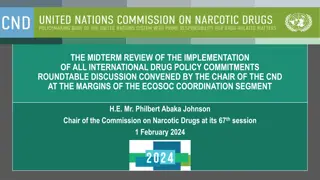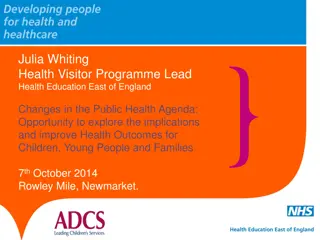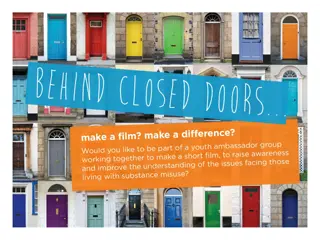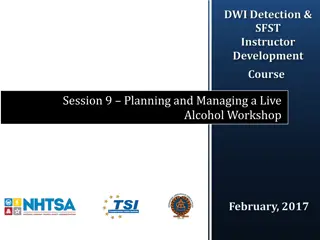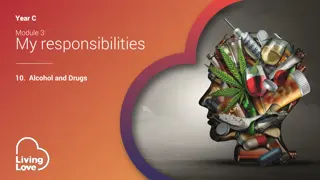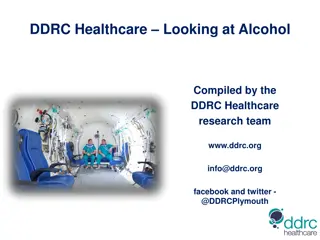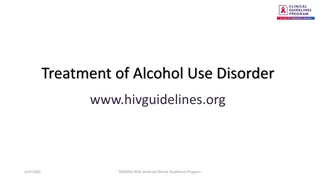Commissioning Services for People with Lived Experience in Alcohol and Other Drug Policy Workshop
The workshop, led by the Alcohol and Other Drug Policy team at ACT Health, focuses on engaging with people with lived experience and peer representatives to inform the commissioning of non-government AOD services. Sessions aim to gather insights on current treatment services, areas for improvement, and peer support opportunities. The roadmap includes strategizing, designing, procuring, and delivering outcomes through continuous evaluation. Additionally, discussions on the next Drug Strategy Action Plan are underway to address achievements and challenges.
- Commissioning Services
- Alcohol and Other Drug Policy
- Lived Experience
- Peer Representatives
- Drug Strategy Action Plan
Download Presentation

Please find below an Image/Link to download the presentation.
The content on the website is provided AS IS for your information and personal use only. It may not be sold, licensed, or shared on other websites without obtaining consent from the author. Download presentation by click this link. If you encounter any issues during the download, it is possible that the publisher has removed the file from their server.
E N D
Presentation Transcript
AOD Policy Workshop: People with lived experience & peer representatives Commissioning services to meet the needs of people with lived experience and peer representatives 4 February 2022 Alcohol and Other Drug Policy team, ACT Health
Purpose of the session One of several strategising workshops focusing on key areas Young people Women and families AOD and mental health AOD specialist services Informing our approach to commissioning the non-government AOD services our community needs from 1 January 2024 and the next Drug Strategy Action Plan Collaboration with community and health sector partners, service users and other key stakeholders is a key part of this process We are keen to hear from you! This session will be interactive 2
Purpose of the session Our aim in this session is to hear from people with lived experience and peer representatives about: The experiences of people accessing alcohol and other drug treatment services What is working well or needs to be improved in terms of how Government and AOD services engage with people with current or previous lived experience Existing peer support services and opportunities in this space For people working in AOD services or Government, we are keen to hear how you are engaging with people with lived experience and areas for improvement. 3
Commissioning Roadmap Commissioning cycle 1. Strategise 2. Design 3. Procure 4. Deliver Outcomes + Continuous evaluation Strategise phase Understand current services and population need Identify service gaps and emerging priorities Define system outcomes we are seeking to achieve Engage with service users and sector partners to test and refine understanding Develop strategic plan, including priorities for commissioning Identify areas for collaborative design Commissioning Roadmap can be found here 4
Next Drug Strategy Action Plan (DSAP) The ACT Drug Strategy Action Plan (DSAP) is the ACT s plan under the National Drug Strategy 2017-26 DSAP 2018-2021 ended in December 2021 The final Progress Report 2020-21 and DSAP Policy Review will be released following consultation to reflect on achievements and challenges Development of the next DSAP has begun The Discussion Paper on the next DSAP is currently out for feedback until 18 February 2021 We would like to hear your input in this session on priorities for lived experience and peer support 5
Why people with lived experience & peer representatives? Historically, people who use or have used drugs were rarely included in discussions that affected their lives, but this is changing Insights from people with lived experience and peer representatives lead to better AOD policies and person- centred program development and implementation Important to recognise and centre the expertise of people with lived experience and utilise this knowledge to improve services and systems All people have the right to be involved in decisions affecting their lives 7
What we know: Community representation at AOD treatment services Service Users Satisfaction & Outcome Survey (2018): On the survey day in 2018, (particularly service users accessing non- residential AOD services): at least 61.2% of adult service users are parents; and of these, 70.8% have children aged under 18 years nearly one-third of all respondents indicated that they were of Aboriginal and/or Torres Strait Islander origin 20.4% identified that they had a physical or intellectual disability 13.3% identified as being from a culturally and linguistically diverse background 9.7% of service users identified as lesbian, gay, bisexual, intersex or queer 8
People who use ecstasy, cannabis or other stimulants Persona Profile Ecstasy, cocaine or other stimulants monthly in past 6 months 52% had mental health issue in last 12 months <5% currently receiving drug treatment 60% reported weekly/more frequent cannabis use Not especially engaged in treatment 21 years old 56% male (55% students, 31% unemployed, 34% employed full time) What Gaps/Opportunities can be addressed? Services Not especially engaged with treatment system may not require treatment or consider they have a problem Service access and navigation support Proposal for simple drug offence notices could help to prevent interaction with the criminal justice system Harm reduction services Focus on education, early intervention and harm reduction Student health services Links with mental health services Fixed site pill testing
People who inject drugs Persona Profile Heroin 77%, crystal meth 77%, powder meth 27% 49% currently in drug treatment 100% used cannabis in last 6 months and 56% used cannabis daily 19% had a non-fatal overdose in last 12 months 48% had injection-related health issue in last month 44 years old 74% male 90% unemployed, 9% no fixed address (hard to reach) Services What Gaps/Opportunities can be addressed? Needle and Syringe Programs Service access and navigation support Naloxone and CAHMA s peer support program Service co-ordination support (mental health and GP) Some drug treatment services Harm reduction 45% had completed naloxone training Of these 45% had resuscitated someone using naloxone Better links to housing 48% had injection-related health issue in last month
What we know AOD treatment and peer support services Individuals, families and carers access a wide range of AOD treatment and support services in the ACT They also access peer support services Peer service workers use lived experience and training to support and represent people already in AOD treatment, or seeking to access AOD treatment The ACT COVID-19 experience at the end of 2021 highlighted the benefit of effective partnerships between Government, AOD services and peer based services 11
What we know: Service user satisfaction Service Users Satisfaction & Outcome Survey (2018): On the survey day in 2018, (particularly service users accessing non-residential AOD services): The overall reported level of service satisfaction was high, with 92.4% of survey respondents stating that they were overall mostly satisfied or very satisfied with the service that they had received, and 93.1% indicating that they would come back to this service if they needed help again. 12
What weve heard: Treatment and support services Increase access to effective and affordable treatment and support services, for people who use drugs, and their families and carers Ensure clients are at the centre of care Stigma remains an issue which can delay or stop people and families from seeking support Ensure culturally appropriate services for CALD and Aboriginal and Torres Strait Islander people Increase funding and provision of LGBTQIA+ alcohol and drug services Improve integration, coordination and linkages between services Increase services to families counselling for children of people who use drugs focus on drug education for people who use drugs and their families 13
What weve heard (2): Treatment and support services Fund peer support including a southside peer support service Supervised injecting facility Increase early intervention in related sectors Increase non-residential rehabilitation for those who work and have caring responsibilities Introduce involuntary treatment with pre and post support Expand needle and syringe programs (NSPs) Action a needle and syringe program at the adult prison Ensure appropriate resourcing of treatment to respond to diversions Expand overdose prevention Refocus funding to health human rights approach Address underlying social issues 14
What weve heard (3): Workforce related Establish AOD peer support workers network Increase sector workforce training funding Expand training for other sectors Increase opportunities for peers to transition to AOD sector workers Ensure a highly qualified workforce, but also that staff are supported and sustained 15
Representation in DSAP governance & commissioning The previous Drug Strategy Action Plan 2018-2021 (DSAP) had an Advisory Group which brought together representatives from across ACT Government, peak bodies, community organisations and peer based consumer organisations to monitor implementation of the plan and identify emerging issues DSAP Review found that consideration could be given to additional consumer representation in the new plan governance structure Stakeholders have called for co-design in the development of new models of service in the ACT. This is consistent with the Government s approach to the commissioning process Some AOD treatment services also have people with lived experience as part of their governance structures 16
DISCUSSION 17
Question 1 (10 minutes) How are current services working well to serve the communities you represent? Where are the areas of strength in the sector or community that could be maintained or built upon? 18
Question 2 (15 minutes) What are the key areas of need right now? Are there particular needs of the communities you represent that are not being met? Are services accessible where and when needed? 19
Question 3 (10 minutes) Are there any emerging or anticipated areas of need in the next 5-10 years? 20
Question 4 (15 minutes) What would you like to see change? Are there things you ve learned from your or others experience? Are there any friction points with current services or things that could be improved? What is not working smoothly? Where is further integration or coordination between services/sectors needed? What would success look like? 21
Question 5 (20 minutes) What specific action/s could the sector, Government and non- government, take in the next 5 years to make an impact for the communities you represent in relation to AOD? Think about What would make the most impactful change? What would be an easy win with a small adjustment? How could work in the short/medium term help to move us towards a significant long-term goal? What evidence-based action could be implemented? How could existing resources be realigned to the benefit of the community? How can we better reach and provide services to particular communities you represent? 22
Question 6 (10 minutes) Out of all the ideas raised so far, what would your top 1-2 priorities be? Are there others that we haven t heard yet? 23
Question 7 (10 minutes) Are there enough opportunities for people with lived experience and their families, carers and peer representatives to engage with Government and services to inform decision making? How could this be improved or expanded? What supports are needed to facilitate this? 24
Question 8 Are there areas where you would like to see more peer support services available? 25
Question 9 (5 minutes) What is the best way for Government to hear more from people with lived experience in this process? 26
Next steps Next workshops: AOD and mental health, and AOD specialist services A written summary of strategise process, including these workshops, will be circulated and made public Next Commissioning Phase: Collaborative Design, will follow when Strategise Phase is complete. This process will also be open to participation The DSAP Progress Report 2020-21 and Review are out for feedback until 11 February and will be released publicly following consultation The Discussion Paper on the next DSAP is out for feedback until 18 February There will be further opportunities for input on commissioning and next Drug Strategy Action Plan 27
Questions/comments? Contact Us AODpolicy@act.gov.au 28
